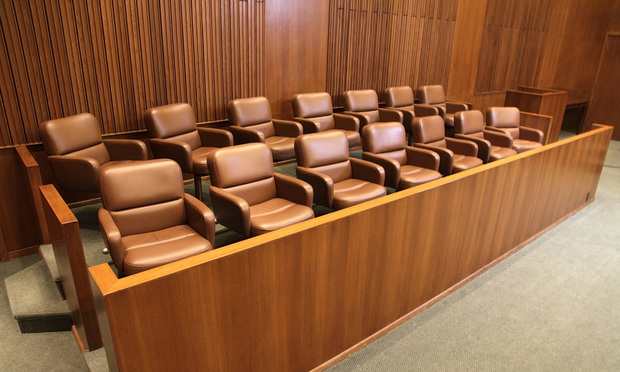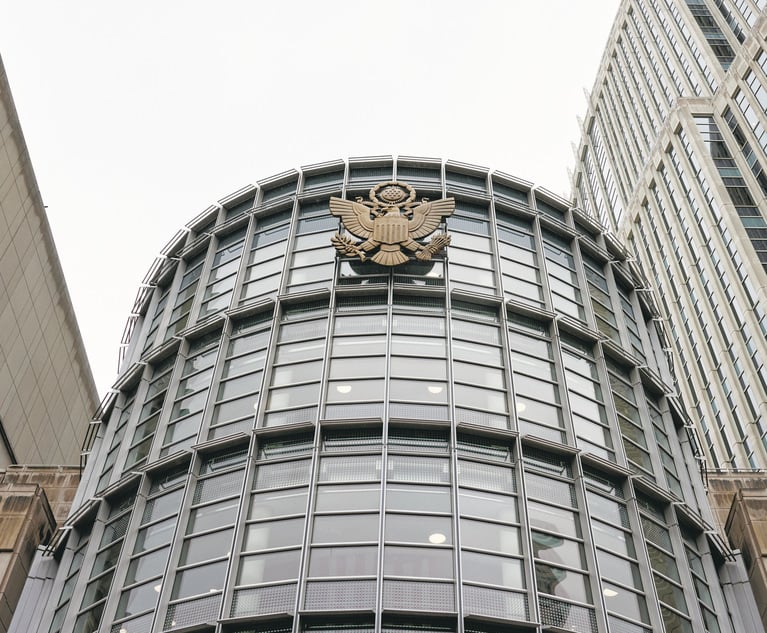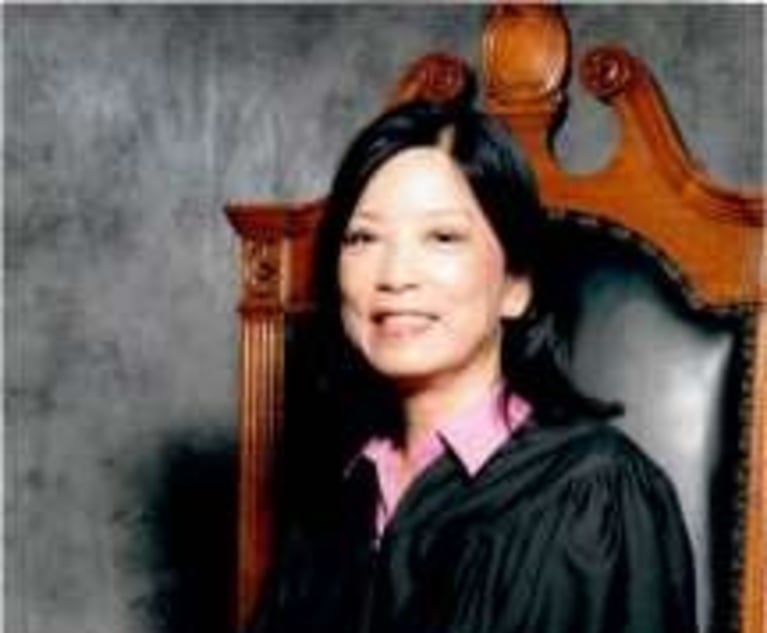Coronavirus Concern Interrupts Manhattan Criminal Trial
A federal criminal trial in Manhattan was interrupted today when the judge informed lawyers and spectators that a member of the jury pool had been contacted by health authorities about possible exposure to the coronavirus.
March 05, 2020 at 08:06 PM
3 minute read
 Photo: Jason Doiy/ALM
Photo: Jason Doiy/ALM
A criminal trial in Manhattan was interrupted Thursday when the judge informed lawyers and spectators that a member of the jury pool had been contacted by health authorities about possible exposure to the coronavirus.
U.S. District Judge Alison Nathan of the Southern District of New York said the prospective juror—who wasn't selected for the case—had attended the same synagogue as a person who's been diagnosed with coronavirus and that the courtroom will be thoroughly cleaned "as a precautionary measure."
Nathan called a break in the trial of Ali Sadr Hashemi Nejad, who is charged with helping an Iranian construction company avoid U.S. sanctions, to discuss the issue with lawyers while deciding whether to go forward with the trial after a break or to send jurors home early for the day.
"It's not an issue any of us had to deal with before," Nathan said.
Jury selection in the case was conducted Monday, with dozens of potential panelists crowding into the jury box and spectator benches in the courtroom for most of the day. The jury was picked by the end of the day Monday, and opening statements from the prosecution and defense took place Tuesday morning.
Nathan called jurors back into the courtroom around 11:20 a.m., telling them they'd be taking "an early lunch break so the process can continue." She told them the trial would resume at 12:30 p.m. in a large courtroom on the first floor of the federal courthouse, in downtown Manhattan's Foley Square. Nathan didn't immediately tell jurors the reason for the early break and the courtroom change.
During the lunch break, Nathan told the lawyers that the potential juror had received a letter from the Health Department saying that he or she had attended the synagogue on the same day as an infected person. The potential juror had no signs or symptoms of the illness, the judge said.
Nathan spoke to the jury privately at the end of the break.
"I think it went fine with the jurors," she told the lawyers, before bringing the jury into the courtroom for the afternoon session. "They seemed accepting of the information."
At least 13 New Yorkers have tested positive for the coronavirus, including a New Rochelle man who works as a lawyer in Manhattan. He's currently hospitalized. The New Rochelle synagogue attended by the lawyer was closed on Tuesday and families who'd recently attended services there were asked to quarantine themselves.
Nejad, a dual Iran-St. Kitts citizen, is accused of sanctions evasion, money laundering and bank fraud. Nejad allegedly funneled $115 million in payments for a Venezuelan housing development through the U.S. financial system to ultimately benefit an Iranian construction company owned by his father.
The jury has been hearing testimony from FBI agents, a former executive of the construction firm and a U.S. Treasury Department official, among others.
This content has been archived. It is available through our partners, LexisNexis® and Bloomberg Law.
To view this content, please continue to their sites.
Not a Lexis Subscriber?
Subscribe Now
Not a Bloomberg Law Subscriber?
Subscribe Now
NOT FOR REPRINT
© 2025 ALM Global, LLC, All Rights Reserved. Request academic re-use from www.copyright.com. All other uses, submit a request to [email protected]. For more information visit Asset & Logo Licensing.
You Might Like
View All
Haynes and Boone Expands in New York With 7-Lawyer Seward & Kissel Fund Finance, Securitization Team
3 minute read
Ticket-Fixing Scheme Results in Western NY Judge's Resignation—for a Second Time

Disbarred NY Atty Receives 54-Month Prison Sentence After $3M Embezzlement
3 minute read
Legal Community Mourns the Loss of Trailblazing Judge Dorothy Chin Brandt
Trending Stories
Who Got The Work
J. Brugh Lower of Gibbons has entered an appearance for industrial equipment supplier Devco Corporation in a pending trademark infringement lawsuit. The suit, accusing the defendant of selling knock-off Graco products, was filed Dec. 18 in New Jersey District Court by Rivkin Radler on behalf of Graco Inc. and Graco Minnesota. The case, assigned to U.S. District Judge Zahid N. Quraishi, is 3:24-cv-11294, Graco Inc. et al v. Devco Corporation.
Who Got The Work
Rebecca Maller-Stein and Kent A. Yalowitz of Arnold & Porter Kaye Scholer have entered their appearances for Hanaco Venture Capital and its executives, Lior Prosor and David Frankel, in a pending securities lawsuit. The action, filed on Dec. 24 in New York Southern District Court by Zell, Aron & Co. on behalf of Goldeneye Advisors, accuses the defendants of negligently and fraudulently managing the plaintiff's $1 million investment. The case, assigned to U.S. District Judge Vernon S. Broderick, is 1:24-cv-09918, Goldeneye Advisors, LLC v. Hanaco Venture Capital, Ltd. et al.
Who Got The Work
Attorneys from A&O Shearman has stepped in as defense counsel for Toronto-Dominion Bank and other defendants in a pending securities class action. The suit, filed Dec. 11 in New York Southern District Court by Bleichmar Fonti & Auld, accuses the defendants of concealing the bank's 'pervasive' deficiencies in regards to its compliance with the Bank Secrecy Act and the quality of its anti-money laundering controls. The case, assigned to U.S. District Judge Arun Subramanian, is 1:24-cv-09445, Gonzalez v. The Toronto-Dominion Bank et al.
Who Got The Work
Crown Castle International, a Pennsylvania company providing shared communications infrastructure, has turned to Luke D. Wolf of Gordon Rees Scully Mansukhani to fend off a pending breach-of-contract lawsuit. The court action, filed Nov. 25 in Michigan Eastern District Court by Hooper Hathaway PC on behalf of The Town Residences LLC, accuses Crown Castle of failing to transfer approximately $30,000 in utility payments from T-Mobile in breach of a roof-top lease and assignment agreement. The case, assigned to U.S. District Judge Susan K. Declercq, is 2:24-cv-13131, The Town Residences LLC v. T-Mobile US, Inc. et al.
Who Got The Work
Wilfred P. Coronato and Daniel M. Schwartz of McCarter & English have stepped in as defense counsel to Electrolux Home Products Inc. in a pending product liability lawsuit. The court action, filed Nov. 26 in New York Eastern District Court by Poulos Lopiccolo PC and Nagel Rice LLP on behalf of David Stern, alleges that the defendant's refrigerators’ drawers and shelving repeatedly break and fall apart within months after purchase. The case, assigned to U.S. District Judge Joan M. Azrack, is 2:24-cv-08204, Stern v. Electrolux Home Products, Inc.
Featured Firms
Law Offices of Gary Martin Hays & Associates, P.C.
(470) 294-1674
Law Offices of Mark E. Salomone
(857) 444-6468
Smith & Hassler
(713) 739-1250






